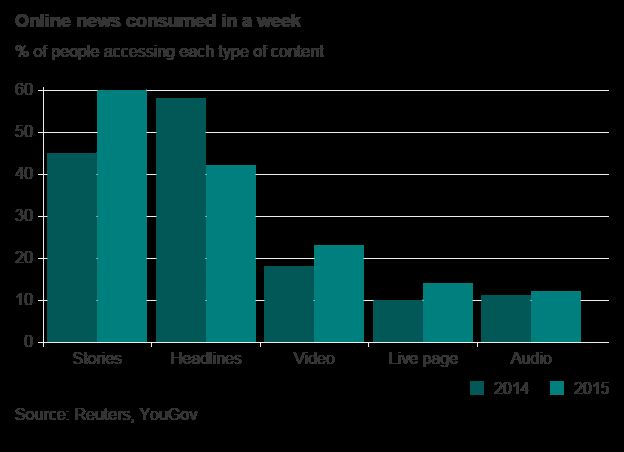牛津大学一批研究者的最新发现让人泄气:75%的英国人说他们永远不会考虑为网上新闻付费,这对付费墙 PayWall 可不是什么好消息。
同时,他们发现,数字订户和网上广告收入不能够弥补报纸销售的 collapse,牛津学者们用词的任性,让人不忍心翻译。这是一个多小时前BBC的报道。
更让人不安的是题图的说明:The trend to reading news on social media sites is affecting traditional brands, a new report finds.
News outlets need 'more inventive' business model
37 minutes ago
 The trend to reading news on social media sites is affecting traditional brands, a new report finds.
The trend to reading news on social media sites is affecting traditional brands, a new report finds.
The trend to reading news on social media sites is affecting traditional brands, a new report finds.
News organisations need to become "more inventive" to arrest a decline in traditional revenue sources, an international survey has warned.
Researchers at Oxford University found that digital subscriptions and online advertising were failing to compensate for the collapse in newspaper sales.
Fully 75% of Britons said they would never consider paying for online news.
Respondents also expressed frustration with so-called "sponsored content" being disguised as news.
The fourth annualReuters Institute's Digital News Report, which is backed by Google, Ofcom and the BBC, surveyed the news consumption habits of almost 24,000 people across 12 countries, including the UK, US, Australia, Japan and Brazil.
Almost half of those questioned said they accessed news on a smartphone - a significant increase on last year's study - but revealed they were loyal to just one or two news sources on the device.
Ad-block 'epidemic'
Additionally, many consumers in the US and UK admitted to using ad-blocking software, eroding many media companies' main source of online revenue.
Ad-blocking, which is installed by default on some browsers, is "reaching epidemic proportions", according to Nic Newman, a research associate at the Reuters Institute.
Publishers were dealt a further blow recently when Apple announced that its latest mobile browser would also come with such a feature.

At the same time, revenue from display ads that do make it through to the reader has continued to fall, particularly for so-called "banner ads" that feature across the top or down the sides of a web page.
Selling ads on smartphones has proven even more challenging, due to the limited amount of screen space.
"The move to mobile is reducing the amount of money news companies can make," says Mr Newman. "The advertising dollars haven't moved across in sufficient amounts yet."
"Unless you've got a massive brand or have a niche, its hard to get people to pay for news," he adds.

Many people, especially younger generations, get a lot of their news from social media
Social climbers
The report also highlights how the huge increase in the use of social media sites as a "gateway" for news is affecting traditional brands.
The number of readers heading directly to specific news websites is falling, while in some countries up to 48% of people access news content via Facebook, YouTube, Twitter, WhatsApp and other services.
News organisations are also facing increased pressure from technology and social media companies topublish content directly on their platforms- with The New York Times, the BBC, National Geographic and others recently joining Facebook's Instant Articles scheme.
However, there are some rays of sunshine for the news industry.
The consumption of online video is rapidly increasing - by as much as 10% in Spain - which is welcome news for companies. Video advertising fetches higher premiums - for the moment at least.

The report also showed substantial growth in sponsored or "branded" content - essentially articles paid for by advertisers, but presented in a similar way to news stories.
About a third of respondents said they felt disappointed or deceived after realising they had read a sponsored article.
"Our research documents that most people like news and use news, but they don't want to pay for it, don't want to see advertising around it, and don't want to see it mixed up with sponsored content," says Rasmus Kleis Nielsen, the Reuters Institute's director of research.
"This means sustainable business models remain elusive even for those who succeed in building an audience."














网友评论